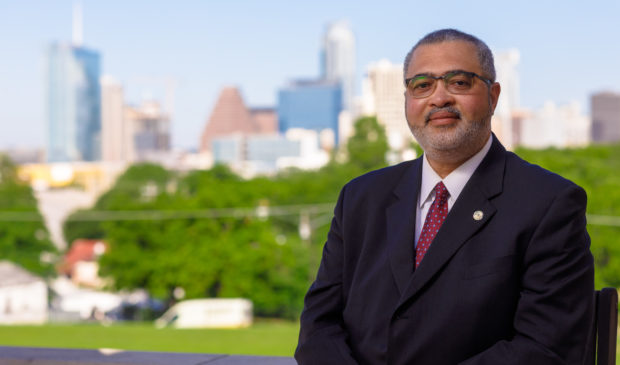Where some see problems, Travillion sees opportunities
Tuesday, December 28, 2021 by
Eniola Longe Travis County Precinct 1 Commissioner Jeff Travillion acknowledges that 2021 was a “challenging year.” But where others saw problems, Travillion saw opportunities.
In areas lacking basic amenities like hospitals, clinics and pharmacies, Travillion made use of public schools and community centers for Covid-19 testing and vaccine roll-out.
“My proudest moment was working with community organizations to organize in the Eastern Crescent,” Travillion said. “We worked with the Community Resilience Trust, the Black Leaders Collective, Austin Voices, churches, constables’ offices, fraternities and sororities to build a system within public spaces.”
“We went into communities and did things to build trust in government processes that had been destroyed over years,” Travillion continued. “We had to bridge that gap and say, this is something that is going to protect the community and nobody is going to make you feel like you shouldn’t have access.”
Relief efforts during Winter Storm Uri were carried out in partnership with the Central Texas Food Bank, Cook’s Nook, Black Women in Business, and Saffron Trust. Schools without grocery stores within a 2-mile radius were used as pantries, “because that is where communities congregate,” he said.
The groups worked with churches to identify those who were elderly, sick and shut-in, to cook and bring them food. “Until the private sector catches up with making access to food available, we can use our public resources and our nonprofit entities to make sure that we know where our underserved populations are, and we provide services to them as a public entity,” Travillion said.
In November 2020, after his reelection, one of the items on Travillion’s to-do list was workforce training for county inmates – and for residents of Travis County in general – to prepare for the high number of jobs Tesla and other companies would be bringing to the area. He explained that the county has invested $100,000 to train incarcerated people “so that they can get a job coming out.”
The effort is helped by a partnership with the Texas Workforce Commission and Melvin White, founder of the Digital Workforce Academy.
“The way you make sure people don’t come back to jail is to ensure that they get a job where they can take care of their family when they leave,” Travillion said.
“Of the first 5,000 jobs Tesla is bringing, at least 3,000 of them will be semi-skilled jobs,” he notes. A semi-skilled job is one that requires a certification as opposed to a four-year degree.
“We want to plan, we want to be purposeful,” Travillion said. “We want to build a pipeline so that the tax dollars that have been invested in bringing these businesses are going to pay benefits for the local communities.”
The Tesla plant is strategically situated between two ZIP codes that have great health care disparities. “That was not a mistake,” Travillion said. “We have been looking for investment in the Eastern Crescent for a long time.”
As Project Connect evolves, Travillion wants to reevaluate the types of jobs being created at Capital Metro to ensure enough people are being trained to be operators and mechanics. Using the principles of the Davis-Bacon Act, Travillion also plans to reevaluate salaries to ensure that workers are being offered the prevailing market rate.
“We have to understand that Austin is the most expensive housing market in the state,” he said, adding, “We’ve got to make sure that the people who are living here are making the wages necessary to live in the areas where they work.”
“The most important thing for me is to remove barriers from opportunity and to organize communities to take advantage of the tools that have been put in place for economic success. I take that very seriously,” Travillion said.
This story was written by a journalism student at the University of Texas at Austin. The Austin Monitor is working in partnership with the UT School of Journalism to publish stories produced by students in the City and County Government Reporting course.
The Austin Monitor’s work is made possible by donations from the community. Though our reporting covers donors from time to time, we are careful to keep business and editorial efforts separate while maintaining transparency. A complete list of donors is available here, and our code of ethics is explained here.
You're a community leader
And we’re honored you look to us for serious, in-depth news. You know a strong community needs local and dedicated watchdog reporting. We’re here for you and that won’t change. Now will you take the powerful next step and support our nonprofit news organization?






